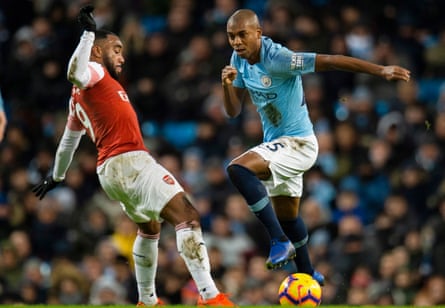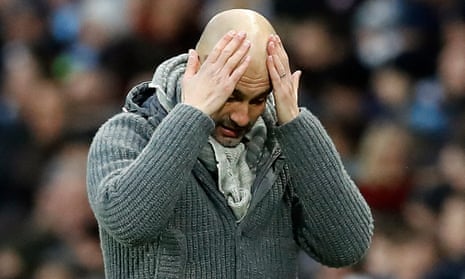Football can be a confusing world at times, when narratives clash to leave an outcome that seems to mean two entirely different things simultaneously. Manchester City are a team that lack the personality to handle setbacks, runs one theme; Pep Guardiola is too intense, too controlling, and the result is a highly skilled but neurotic side who cannot think for themselves when the going gets tough. Arsenal are a team that lack the backbone for big away games, runs another. Praise City for getting out of trouble on Sunday, then, or wonder how they got into that position in the first place?
Most significant in terms of the title race, perhaps, is that City did what they failed to do last Tuesday. Facing fragile opposition a day before Liverpool play, they won, cutting the gap so the nervy leaders can feel the pursuing breath on their necks for 24 hours before they kick off, breath made all the more unsettling by a quirk of the calendar – City’s game against Everton initially scheduled for the weekend of the Carabao Cup final rearranged for Wednesday – that means if Liverpool fail to win at West Ham, the champions could be top before the next weekend’s fixtures.
So, credit to City then for showing laudable gumption under pressure, finding a second goal of exquisite quality just as things were threatening to go awry before half-time and then dominating the second half so completely Arsenal did not muster a shot. But on the other hand: lads, it’s Arsenal.
It’s four years since the Coquelin Peculiarity, that still inexplicable afternoon when Arsenal came to the Etihad with a bodged-together midfield, played an unfamiliar containing game and won 2-0. This was their 19th away game since against one of the Big Six. They have won one of those games. Imagine overthinking a home match against Arsenal.
And yet that’s precisely what Guardiola seemed to have done with one of those team selections that has everybody in the ground juggling names from an hour before kick-off, trying to work out how on earth it all fits together. Guardiola’s grey over-cardigan gives him an even more monastic air than usual, as though he has spent furious nights in his cell poring over the scriptures to emerge, eyes burning against the dark void of the hood that sits at his neck, with the dread gnosis that will challenge everything the world thought it knew. Which in this case, meant shifting Aymeric Laporte to the left and fielding Fernandinho at centre-back.

Ultimately, of course, it worked. It was Fernandinho bringing the ball out from the back, striding through Arsenal’s functional midfield line and spraying a pass out to Raheem Sterling on the left – staying notably wider than Leroy Sané had against Newcastle – that brought the vital second just before half-time. Vindication? Perhaps.
But in the half hour before that goal, City had been the edgy City of the second halves against Leicester, Crystal Palace and Newcastle, their passing a little off, their domination a little sterile, playing as though to prove the adage that City are never so vulnerable as after Sergio Agüero has scored a first-minute goal. Where was character to reassert themselves after conceding an equaliser? (Where, for that matter, was the marking at the corner that led to the equaliser?) Where was the leader to grab the game and yank it back their way?
He certainly wasn’t in the technical area, where Guardiola fumed and raged and gesticulated. A genius, most certainly, but here you saw just how exhausting he must be to play for, his nervous energy only adding to the general sense of anxiety. And yet, just as the doubts were mounting, he prevailed.
A manager makes an unexpected tactical tweak, wins the game with his side strolling their way through the second half, the key goal stemming from the player whose position he has changed. It sounds conclusive and perhaps it is: a Guardiola-inspired success. But another thought intrudes – which is that when Stephan Lichtsteiner, at 35 raging vainly against the dying of the light, is the opposing right-back, plans perhaps don’t need to be that complex: all three goals came down his flank, two from Sterling getting in behind.
There remains a sense that when the pressure is on, Guardiola overthinks the problem. An immediate warning sign is Fernandinho, Ilkay Gündogan, Kevin De Bruyne and David Silva in the same side. They played together in four league games in 2016-17, and won only one. They played together in the scratchy Carabao Cup final win over Arsenal last season and in the Champions League quarter-final first leg defeat by Liverpool. This was the first time they had started together this season and the result was that underwhelming first half.
Yet in the end City won with ease. They did what they’ve been asked to do and overcame the uncertainty. They look no more nervous than Liverpool. And yet it’s hard to avoid the feeling that if they can make that much of a meal of beating Arsenal at home, even if the concerns lasted only half an hour, there will be greater wobbles ahead.

